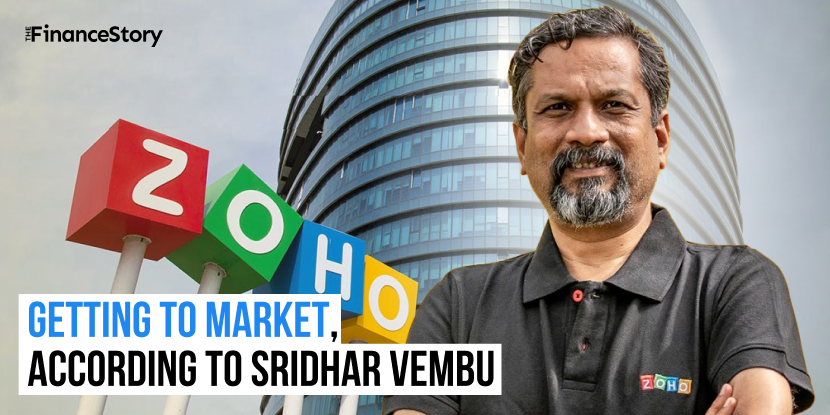- Sridhar Vembu recently spoke to startup founders and product heads about “Being Financially Prudent in the Current Economic Environment”.
- He believes that the key to building a company is to “understand the nature of market opportunity”.
Sridhar Vembu’s Zoho Corp survived the telecom bubble of 2000 and the housing bubble of 2008
Surviving these tough times requires good leadership skills, a great team, and a product. All of this has made Zoho thrive when many of its peers either buckled under pressure or ran out of money.
For the last 26 years, he has built Zoho Corp, formerly Advent Net, which rebranded in 2009, to become a leading software-as-a-service company.
Today a part of Zoho’s workforce builds global software from their native towns or at least close to a center, which is an hour away from their villages. Sridhar is a wealth of knowledge and experience.
Today, its suite of products provides startups, SMEs, and large corporations with the tools necessary to build great companies.
Sridhar recently spoke to a slew of founders on a live webinar about how to build a great company in a podcast titled:
“Being Financially Prudent in the Current Economic Environment“. Here are the excerpts:
“Funding is not easy during a slowdown. Even when funding is available, valuations will be very high and that does not last long. Once it drops it takes several years to come back to its peak” says Sridhar Vembu.
Advice 1:
- The most common advice is to stop the immediate bleeding. Become cash flow positive quickly. That is what ER doctors do (stabilize the patient) and it is very important. Do not panic. Keep in perspective.
“Times will get difficult. But let’s find some way to make a living. One must not panic during business downturns. Success has many fathers and failures have many orphans” says Sridhar.
Advice 2:
- Avoid the temptation to place blame, and avoid infighting. Analyze the medium-to-long term.
“Control your marketing spend and costs. Create a balance between what is going in and what is coming out. When tough times are coming, take care of your employees and be a strong pillar of support for them. Be very open about the status of the company. If you are running out of money, be honest about the layoffs, your employees will respect the honesty. Don’t suddenly lay off people and don’t leave them unprepared.”
Advice 3:
- We must understand the nature of the market opportunity, and what has changed due to the bubble bursting. The nature of the market may be bubble-driven. Is there a durable opportunity for the market? Take an inventory of all customers and check if the segment is losing traction.
“Between 1997-2000, the go-go years of the dot com/ telecom bubble, we grew from 300k to $8 million. In 2001 we had reached a $12 million run rate and when the crash hit us 2001 we were struggling for two years. We faced tough questions and we concluded that the market we were in, software for network equipment vendors, won’t be a long-term durable market.
Arriving at that conclusion was hard because we tend to get comfortable with particular market segments. It also meant admitting that our further efforts in that market segment would be a waste of time. We had 350 people and 200 people got reassigned to completely new products. This was a pivot to new market segments.”
Advice 4:
- Analyze the market segment because the market that Zoho was serving was too overcrowded. For example, in Silicon Valley alone there were more than 200 optical networking companies. Even if there is a market, you have to analyze whether there are too many well-funded players chasing it. Ultimately in business, you need a profit, can you profitably address this market? An organically profitable addressable market (OPAM) is key. This means you are not taking market share with acquisitions, instead you are doing it organically with no spending.
“The reason why OPAM is a great way of looking at things is that you won’t incur cash burn. You can address the market with realistic growth projections. This is a very critical thing to understand because you will settle for profitable growth. In 2000 we had two competitors in our space. Both were doing $50 million in revenues and both were not popular. We were doing $8 million in revenues and we were making profits.
We estimated the OPAM to be only $10 million for that market. By 2004, the competition was gone and we continued with $10 million in revenues for a decade more with that business. The profits we made, we invested in new market opportunities which led to Zoho and many products like Zoho Books.”
Advice 5:
- For a longer-term business, you have to reinvent your business plans. Beware of the trap: Costly inputs, Commodity output. The inputs for the business are rising in price and output is a commodity subject to price pressures. If a critical input is costly and a huge part of your final product value, are you really reselling that input? You have to face this question and face the risks involved.
“If you are dependent on costly inputs and your value addition is low, your gross margins being 25 percent, you have to understand that with all your inputs you are adding only 25 percent. Such a business is precarious and subject to high risk due to input price increases or output price decreases. Get to high gross margins, low prices.”
“In business, you just have to give it your very best and just let the Universe take care of you,” says Sridhar.








hi sir my name is prabhat i belong from chhattisgarh state i want to work with you your company i am very interest company i am 12th pass